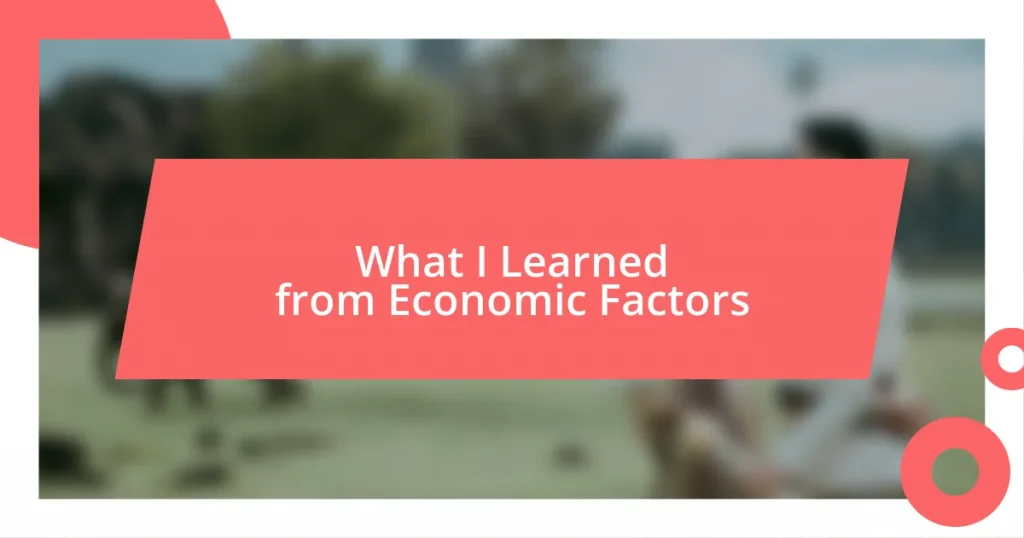Key takeaways:
- Understanding economic factors like inflation, supply and demand, and government policies can significantly impact personal financial decisions and consumer behavior.
- Key economic indicators, such as unemployment rates, GDP, and consumer confidence, provide insight into the health of the economy and its influence on individual experiences and opportunities.
- Adapting financial strategies—through budgeting, automating savings, leveraging technology, and collaborating with others—can enhance resilience during economic fluctuations.
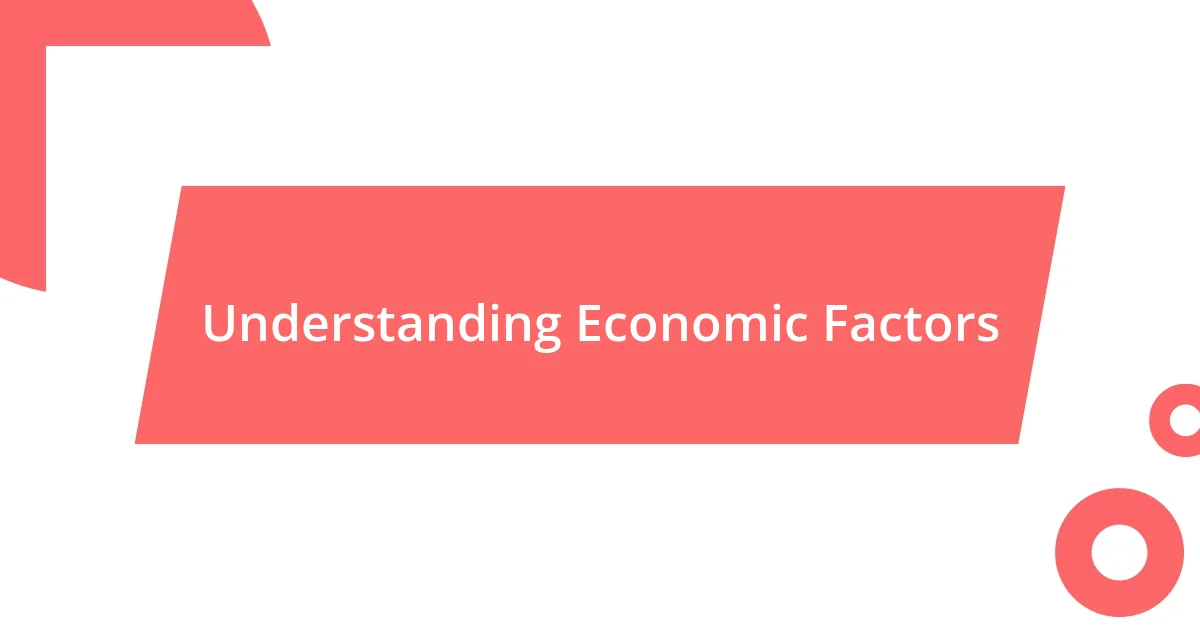
Understanding Economic Factors
Economic factors are the fundamental elements that influence how economies operate and affect our daily lives. For instance, I vividly remember the way rising inflation impacted my purchasing habits a few years back; it forced me to reevaluate my budget and adjust my spending priorities. Have you ever thought about how a simple change in consumer prices can ripple through your own financial decisions?
Understanding supply and demand is another critical piece of the puzzle. I found it fascinating when I noticed the shortage of certain products during the pandemic; items like toilet paper and hand sanitizer became gold mines. This made me ponder: how often do we overlook the delicate balance between what we want and what’s actually available?
Furthermore, government policies play a significant role in shaping economic factors. When my local government introduced new regulations on small businesses, I could see firsthand how it affected my friend’s café. It raised some prices, but it also led to better quality and safety standards. This experience made me realize how interconnected our choices are with the policies around us. Have you ever felt these shifts in your community?
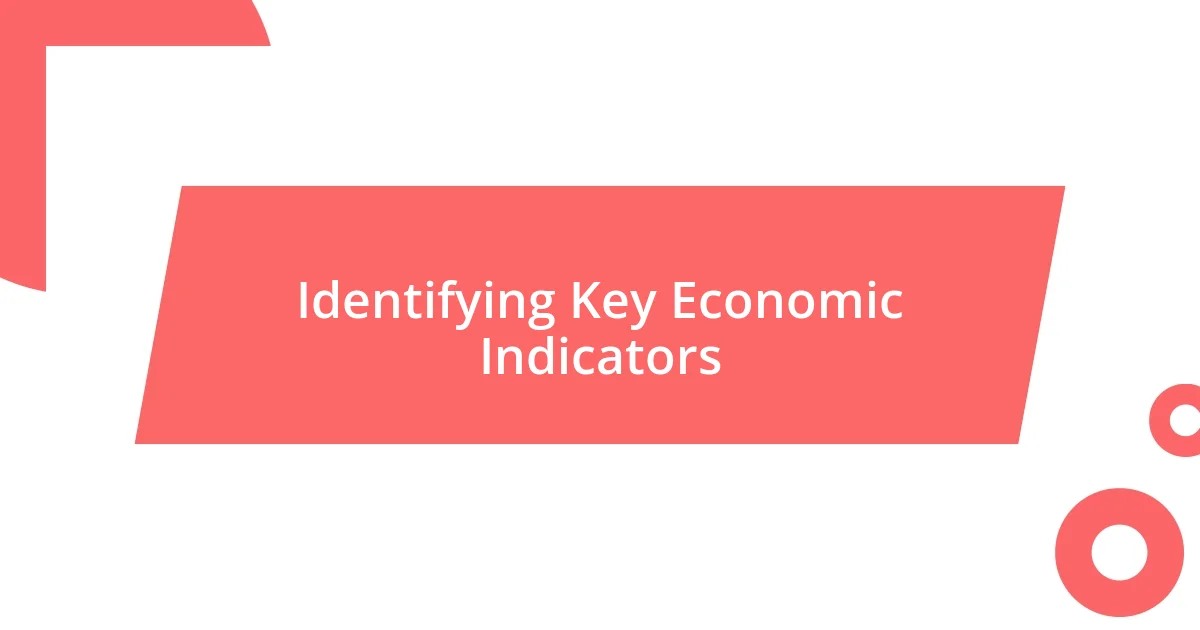
Identifying Key Economic Indicators
Identifying key economic indicators is crucial for understanding the overall health of an economy. For example, I recall the time I closely monitored unemployment rates while job hunting; seeing these rates decrease gave me a sense of hope. It felt reassuring to know that more opportunities were becoming available. I wonder how many of us connect such indicators to our personal experiences?
Gross Domestic Product (GDP) is another vital indicator. During my travels, I noticed firsthand how countries with higher GDPs offer better infrastructure and services. It struck me that these economic figures translate directly into our everyday experiences, from the quality of roads to access to education. Isn’t it fascinating how these numbers tell a story about people’s lives?
Consumer confidence is one more indicator I pay close attention to. When I sensed a dip in this confidence after a significant market fluctuation, I noticed friends hesitating in their spending choices. This hesitation can create a ripple effect, affecting businesses and, ultimately, the economy at large. These moments remind me that the economy isn’t just about numbers; it’s about people.
| Economic Indicator | Explanation |
|---|---|
| Unemployment Rate | The percentage of the labor force that is jobless and actively seeking employment. |
| Gross Domestic Product (GDP) | The total value of all goods and services produced over a specific time period within a country. |
| Consumer Confidence Index | A measure of how optimistic or pessimistic consumers are regarding their expected financial situation. |
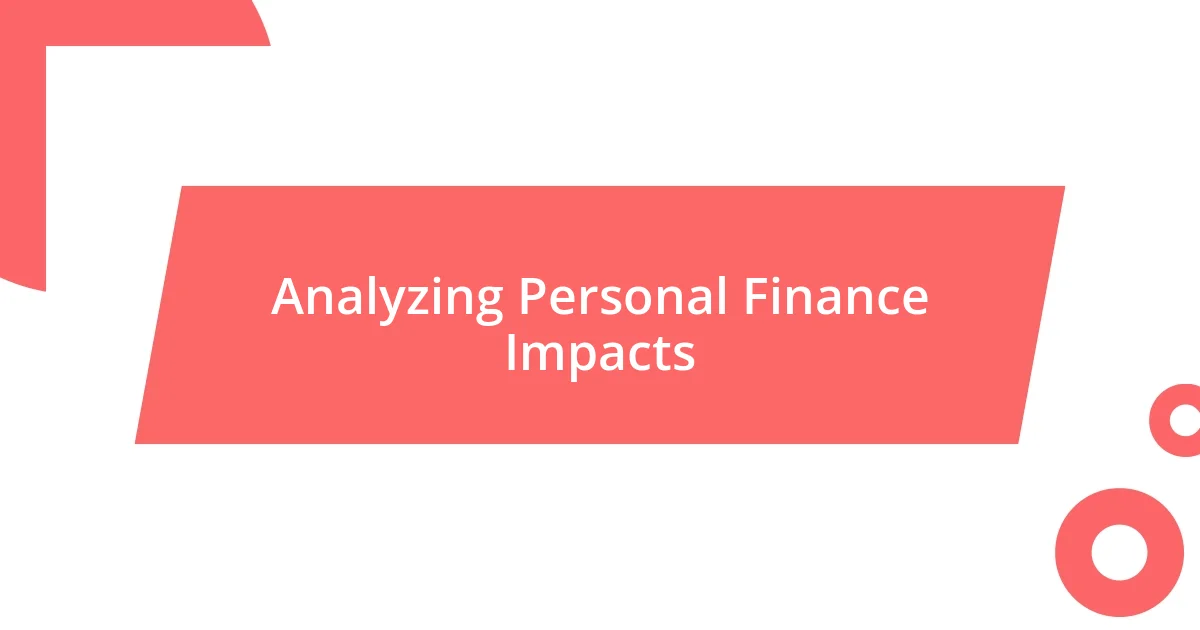
Analyzing Personal Finance Impacts
Analyzing personal finance impacts is like holding a mirror to our spending habits and financial decisions. I remember the time my friend lost her job during an economic downturn. It made me realize how quickly our financial stability can sway with external factors, prompting tight budgeting and prioritizing needs over wants. It’s essential to internalize how broader economic conditions can directly affect our personal financial landscape.
- Job Market Fluctuations: Changes in employment rates can cause shifts in household income, affecting spending power.
- Interest Rates: When I considered buying my first home, the rising interest rates made me rethink my mortgage options. Higher rates mean higher payments.
- Inflation: I noticed the grocery bills skyrocketing recently, which was a harsh reminder of how inflation narrows our ability to save and invest.
- Tax Policies: A tax change last year impacted my refund, which shifted my financial planning for savings.
Understanding these factors can enhance our financial acumen and reinforce the need for adaptive strategies in managing our personal finances. Each adjustment we make reflects not just on our wallets, but on our peace of mind as well.
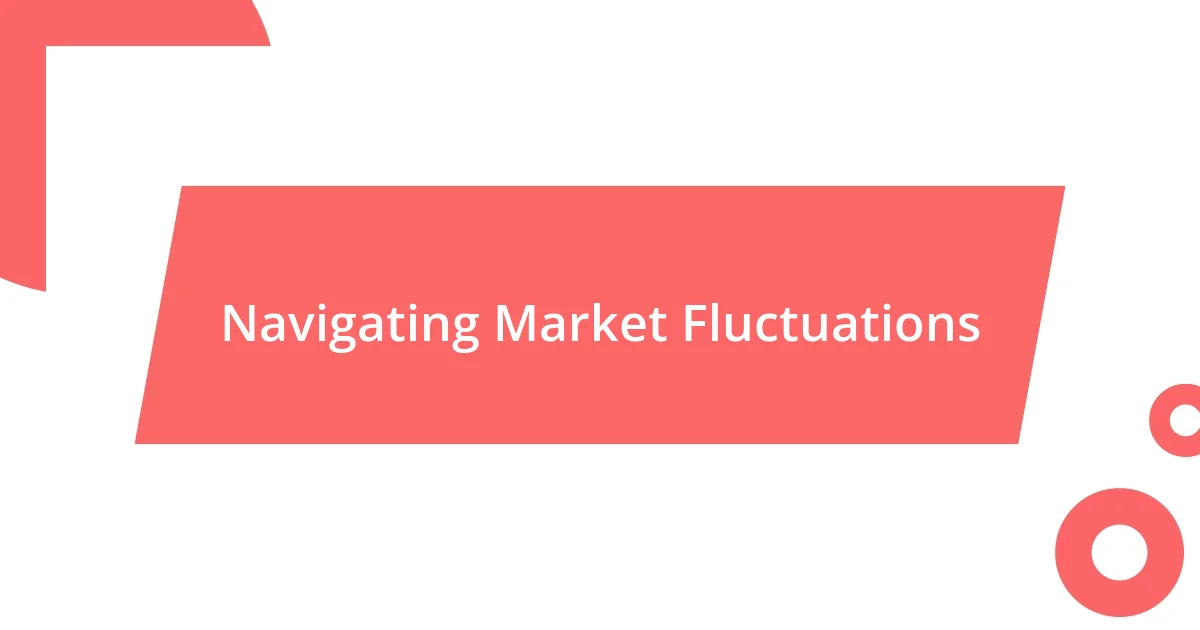
Navigating Market Fluctuations
Navigating market fluctuations can feel like riding a rollercoaster, isn’t it? I remember the anxiety I felt during a sudden stock market drop; my heart raced as I watched the numbers plummet. It dawned on me that awareness and preparation are key. Keeping an eye on economic signals can help us brace for those inevitable dips.
One strategy that I found effective was diversifying my investments. When I shifted some of my portfolio into more stable assets during uncertain times, it provided me with a sense of security. It’s curious how spreading our risk can lead to peace of mind even amidst chaos. Have you ever considered how diversification might shield you from abrupt market shifts?
Reflecting on my experiences, I also learned the importance of staying informed. I frequently read up on economic trends and listen to finance podcasts. Staying updated allows me to feel more in control and better equipped to make decisions. When the economy feels unpredictable, knowledge truly becomes our best ally. How do you navigate the unpredictable waters of market fluctuations?
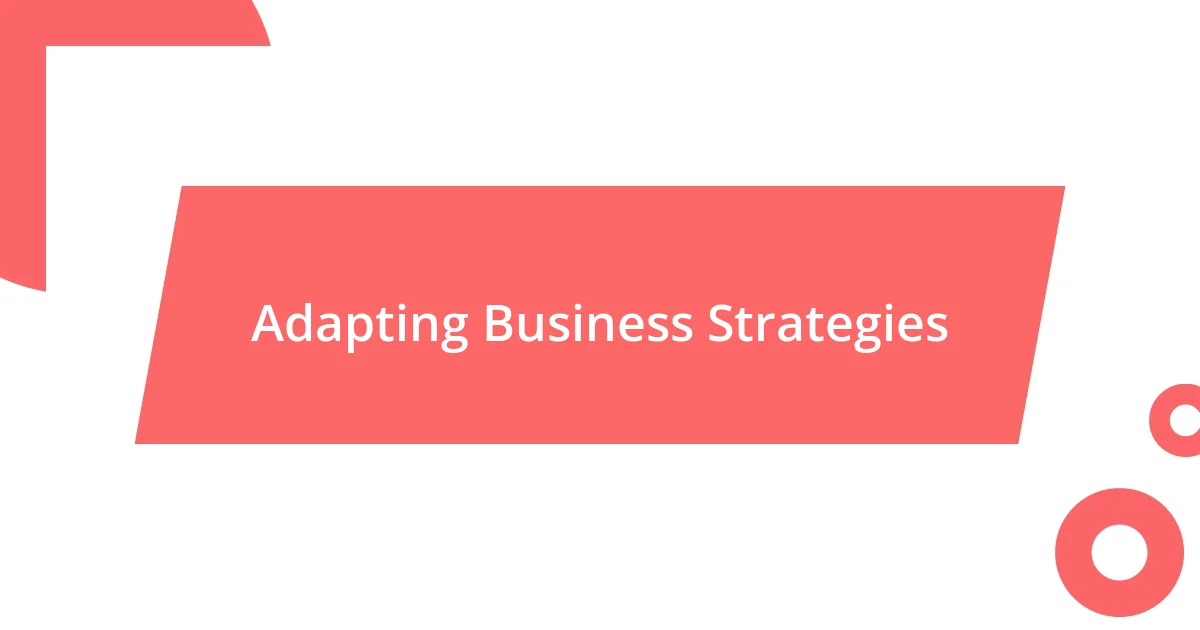
Adapting Business Strategies
Adapting business strategies requires a nimble mindset, especially in unpredictable economic climates. I vividly recall when a friend’s small café faced declining sales due to a sudden increase in rent. They responded by pivoting their menu towards affordable comfort foods, which not only attracted customers looking for value but also reinforced their brand’s community spirit. Have you ever noticed how small changes can create a significant impact?
I’ve also found that leveraging technology can be a game changer during economic uncertainty. My experience with an online crafting business initially taught me the importance of e-commerce. When foot traffic dwindled, pivoting to an online model opened up new revenue streams. It made me think about how technology can empower businesses to adapt, whether through social media promotions or contactless delivery. Have you considered how tech innovations could reshape your business strategy?
Finally, collaboration can enhance resilience. During the last economic downturn, I saw businesses team up to share resources and customer bases. For instance, local breweries partnered with food trucks, creating a vibrant community space that thrived despite larger economic issues. I can’t help but ask: how can collaboration drive innovation in your business model?
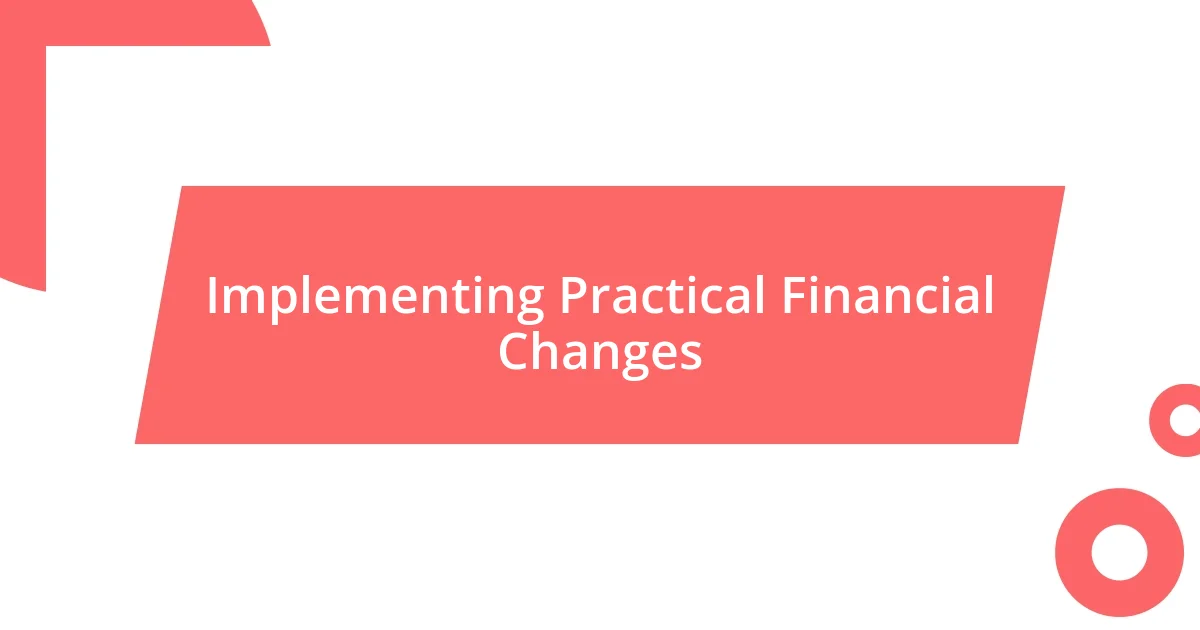
Implementing Practical Financial Changes
Implementing practical financial changes often starts with a simple, honest assessment of your spending habits. I once found myself overwhelmed by subscriptions I hardly used, and it was a lightbulb moment when I decided to track my expenses more closely. Have you ever taken a hard look at your budget to see where you could cut back? It’s fascinating how small adjustments can accumulate and lead to significant savings over time.
Taking action doesn’t always mean making big, sweeping changes. When I started automating my savings, I was surprised at how effortless it became to set aside money for future goals. Every month, a portion of my paycheck would disappear into my savings account before I even had a chance to spend it! Have you tried automating your finances? This simple step transformed my approach to saving and made me feel more secure about my financial future.
Engaging in financial education can also powerfully influence your decision-making process. After attending a few personal finance workshops, I gained insights that reshaped my understanding of investments. I realized how critical it is to ask questions and seek advice — not just to absorb information passively. Reflecting on this journey, I encourage you to engage in discussions about money. What new financial strategies might inspire you to take control of your economic destiny?
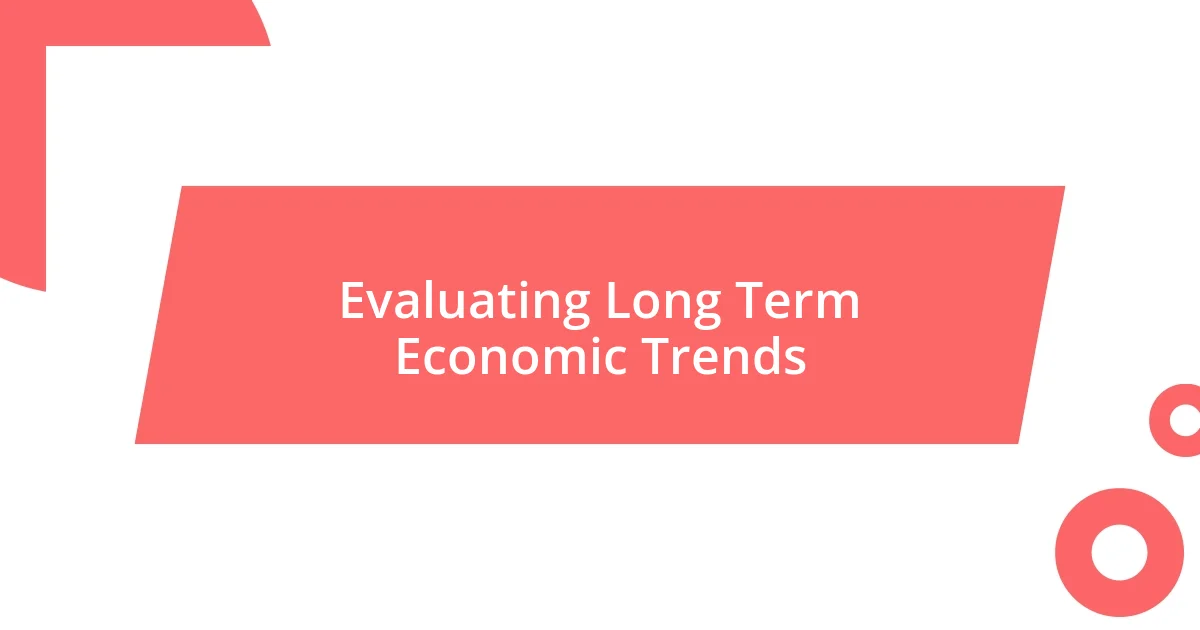
Evaluating Long Term Economic Trends
Evaluating long-term economic trends requires a keen eye for the patterns that unfold over time. One instance that stands out to me is when I analyzed housing market fluctuations in my area. A few years back, I noticed a consistent increase in housing prices followed by a period of stagnation. This pattern made me realize that understanding these cyclical trends could inform significant decisions, such as when to buy or sell property. Have you ever considered how historical economic behaviors could impact your financial future?
On a broader scale, I’ve seen how shifts in consumer behavior reflect long-term economic trends. For instance, during my stint in retail, I observed a growing trend towards sustainable products. This was not just a fad; it signified a broader shift in societal values and purchasing power. Recognizing that allowed my team to adjust our inventory to include eco-friendly options, which not only boosted sales but also resonated with conscious consumers. Isn’t it amazing how staying attuned to these shifts can lead to opportunities for growth?
Moreover, evaluating these trends means going beyond mere numbers; it involves understanding the underlying social and economic forces at play. During one economic downturn, I tracked how unemployment levels influenced spending habits in my community. By connecting those dots, I was able to appreciate the dynamics of economic resilience — how communities rally together to support local businesses during tough times. I can’t help but wonder: how can the lessons from long-term economic shifts guide our strategies for a more stable future?










